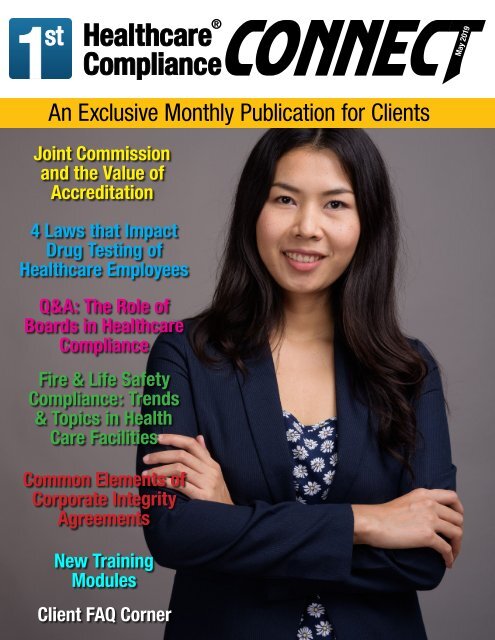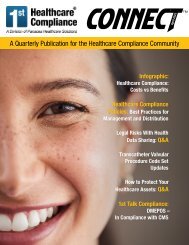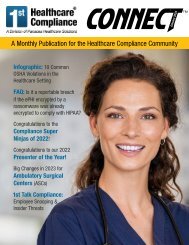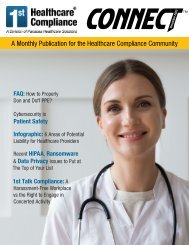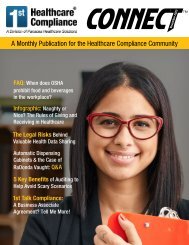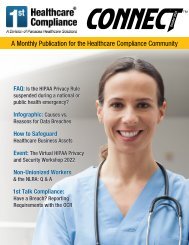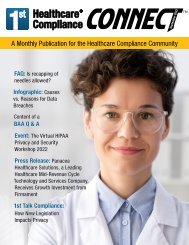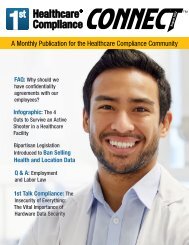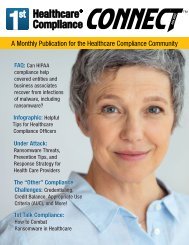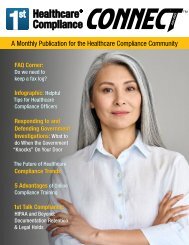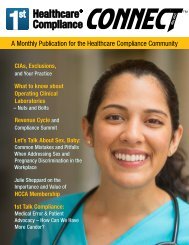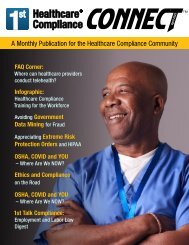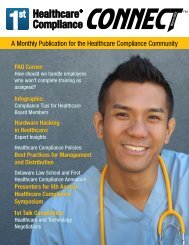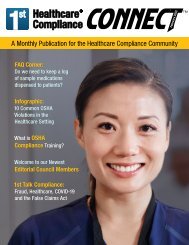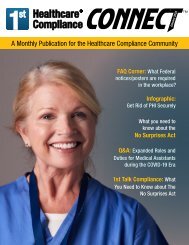First Healthcare Compliance CONNECT May 2019
- No tags were found...
You also want an ePaper? Increase the reach of your titles
YUMPU automatically turns print PDFs into web optimized ePapers that Google loves.
®<br />
<strong>CONNECT</strong><br />
An Exclusive Monthly Publication for Clients<br />
Joint Commission<br />
and the Value of<br />
Accreditation<br />
4 Laws that Impact<br />
Drug Testing of<br />
<strong>Healthcare</strong> Employees<br />
Q&A: The Role of<br />
Boards in <strong>Healthcare</strong><br />
<strong>Compliance</strong><br />
Fire & Life Safety<br />
<strong>Compliance</strong>: Trends<br />
& Topics in Health<br />
Care Facilities<br />
Common Elements of<br />
Corporate Integrity<br />
Agreements<br />
New Training<br />
Modules<br />
Client FAQ Corner<br />
<strong>May</strong> <strong>2019</strong>
Got a Minute? Please Rate Us!<br />
In This Issue:<br />
Share Your Success Story<br />
Joint Commission and the Value of Accreditation<br />
4 Laws that Impact Drug Testing of <strong>Healthcare</strong> Employees<br />
Client FAQ Corner<br />
The health of our company depends on our best<br />
clients spreading the word about us.<br />
That’s you!<br />
Share Your Success Story<br />
An endorsement by you is the greatest compliment we<br />
could receive! Please take a moment of your time to rate<br />
us online so that others can benefit from your experience.<br />
It’s a simple way to help us grow and improve.<br />
We appreciate your support and look forward<br />
to hearing from you!<br />
<strong>Compliance</strong> Super Ninja<br />
Michael Wolf<br />
Practice Administrative Assistant/<strong>Compliance</strong> Coordinator<br />
Total Care Physicians<br />
How would you describe your experience with <strong>First</strong> <strong>Healthcare</strong> <strong>Compliance</strong>?<br />
My experience with <strong>First</strong> <strong>Healthcare</strong> <strong>Compliance</strong> has been a very positive and productive relationship. There has<br />
never been a time where I had to contact them for a question or concern and not get a helpful answer. All the staff<br />
that I have talked to have been kind and courteous. I can tell from many conversations that they take their job very<br />
seriously and want to make sure that their clients are up to date and knowledgeable about HIPAA/OSHA compliance.<br />
What do you enjoy most about working with Total Care Physicians-Wilmington, Newark &<br />
Glasgow?<br />
I’ve been with the company since 2002. I started out as a file clerk managing physical records for the practice<br />
and have worked in other positions that have allowed me to have a great positive relationship with our patients.<br />
However, working in an administrative roll has given me a different perspective on how a medical practice works. In<br />
having said that, what I enjoy most about working for Total Care Physicians is learning the in’s and out’s of running<br />
a practice. After so many years of working with doctors and patients on the front lines, it has been a very rich and<br />
rewarding experience to learn what goes on “behind the scenes”.<br />
Would you rather be able to be free from sales and marketing phone<br />
calls or free from email spam/junk mail for the rest of your life? Why?<br />
Definitely the phone calls. With email, they will get filtered into the appropriate folder<br />
and you don’t notice it as much until you completely clear out those folders. The calls<br />
on the other hand are just too much. Most of the time I don’t even answer my phone<br />
anymore.<br />
Each month we highlight one exceptional compliance professional chosen by our client<br />
services team. If our team notices your compliance chops, you might be the next Ninja!<br />
1st Talk <strong>Compliance</strong> - Fire & Life Safety <strong>Compliance</strong>: Trends & Topics in Health Care<br />
Facilities<br />
Infographic: Common Elements of Corporate Integrity Agreements<br />
Q&A: The Role of Boards in <strong>Healthcare</strong> <strong>Compliance</strong><br />
New Training Modules<br />
2 <strong>First</strong> <strong>Healthcare</strong> <strong>Compliance</strong>, LLC © <strong>2019</strong><br />
Contact Toll Free: 888-54-FIRST 3
Client FAQ Corner<br />
Does HIPAA allow patients to electronically sign an authorization<br />
form?<br />
Yes. HIPAA does not prohibit electronic signatures but there are no regulations or<br />
guidance from the Department of Health and Human Services (HHS) regarding<br />
standards on electronic signatures. Therefore, electronic signatures need to<br />
comply with the Federal Electronic Signatures in Global and National Commerce<br />
(ESIGN) Act and the Uniform Electronic Transactions Act (UETA).<br />
How have HIPAA fines changed?<br />
On April 30, <strong>2019</strong>, HHS issued a Notification of Enforcement that changed the<br />
agency’s interpretation of maximum fines based on the organization’s level of<br />
culpability. The following penalty tier structure was released and will be adjusted<br />
for inflation, which changed the previous annual limit of 1.5 million that applied to<br />
each tier.<br />
Culpability Minimum penalty Annual Limit<br />
No Knowledge $100 $25,000<br />
Reasonable Cause 1,000 100,000<br />
Willful Neglect - Corrected 10,000 250,000<br />
Willful Neglect - Not Corrected 50,000 1,500,000<br />
Explore the FAQs tab in your compliance solution to find<br />
answers to your compliance questions!<br />
New Release Applied To Your System 4/13/<strong>2019</strong><br />
The update includes changes to:<br />
• Password reset procedures<br />
• Vendor zone warning intervals<br />
• License/certification warning emails<br />
• Manager/supervisor lists<br />
Contact Client Services<br />
for additional details.<br />
4 <strong>First</strong> <strong>Healthcare</strong> <strong>Compliance</strong>, LLC © <strong>2019</strong><br />
Contact Toll Free: 888-54-FIRST 5
Joint Commission and the Value of Accreditation<br />
By Julie Sheppard, BSN, JD, CHC<br />
Around the world accreditation is used to assure a high<br />
baseline level of healthcare quality. In the United States,<br />
accreditation is a multi-million-dollar industry without any<br />
sign of slowing down because it’s compulsory for federal<br />
payments and a marketing necessity in an increasingly<br />
competitive landscape.<br />
It’s no secret that healthcare organizations in the United<br />
States depend on revenue. Funding is complex and comes<br />
from various plans including the major federal contributors<br />
of Medicare and Medicaid. In order to receive federal<br />
payments from Medicare or Medicaid programs, a health<br />
care organization must meet the government requirements<br />
for program participation, including a certification of<br />
compliance with the health and safety requirements<br />
called Conditions of Participation (CoPs). Options exist for<br />
meeting CoPs: 1) A survey may be conducted by a state<br />
agency on behalf of the federal government or 2) a survey<br />
by a national accrediting organization such as the Joint<br />
Commission that has been recognized by the Centers for<br />
Medicare & Medicaid Services (CMS).<br />
There are other eligible national accrediting organizations<br />
that conduct surveys to determine whether an organization<br />
meets or exceeds Medicare and Medicaid requirements,<br />
but the Joint Commission is the oldest accrediting body and<br />
accredits or certifies over 21,000 health care organizations<br />
in the United States today. In 1951 a joint agreement<br />
among the American College of Physicians, the American<br />
Hospital Association, the American Medical Association, the<br />
Canadian Medical Association and the American College of<br />
Surgeons created the Joint Commission on Accreditation<br />
of Hospitals (JCAH). The mission statement of the Joint<br />
Commission began explicitly referencing patient safety<br />
during the 1990’s and later programs like Speak Up<br />
were launched to help patients and their advocates become<br />
active in their care.<br />
New standards for Joint Commission are developed and<br />
added only if they relate to patient safety or quality of<br />
care, have a positive impact on health outcomes, meet<br />
or surpass law and regulation, and can be accurately<br />
and readily measured. Those with input include health<br />
care professionals, providers, subject matter experts,<br />
consumers, and government agencies (including CMS).<br />
The accreditation process is lengthy and incorporates<br />
performance-improvement strategies, provides education,<br />
and includes advice and counsel from surveyors during<br />
the on-site survey. Surveys by the Joint Commission<br />
are designed to be organization-specific and consistent.<br />
Resources and consultants are available to help prepare<br />
with mock surveys.<br />
Marketing is part of the drive to achieve accreditation<br />
or certification status. Accreditation is a means of<br />
proving quality to the community and the competition.<br />
After earning accreditation or certification, health care<br />
organizations receive The Joint Commission’s Gold Seal<br />
of Approval®. Sometimes the terms accreditation and<br />
certification are mistakenly used interchangeably. Both<br />
accreditation and certification require an evaluation<br />
by The Joint Commission, but they apply to different<br />
types of entities. The evaluation covers compliance<br />
with the standards and other requirements and verifies<br />
improvement activities.<br />
Joint Commission accreditation can be earned by many<br />
types of health care organizations, including hospitals,<br />
doctor’s offices, nursing homes, office-based surgery<br />
centers, behavioral health treatment facilities, and<br />
providers of home care services. Certification is earned<br />
by programs or services that may be based within or<br />
associated with a health care organization. For example,<br />
a Joint Commission accredited medical center can have<br />
Joint Commission certified programs or services with<br />
neurological or orthopedics. These programs could be<br />
within the medical center or in the community. Other<br />
certifications include health care staffing services,<br />
integrated care, medication compounding, memory care,<br />
and primary care medical home.<br />
Studies regarding the impact of accreditation on<br />
patient outcomes lead to questions about the value of<br />
accreditation in healthcare. These are important questions<br />
because physician depression and burnout rates are at<br />
an all-time high and this process increases the burden for<br />
physicians and administrators. Whether working toward<br />
accreditation or certification with Joint Commission or<br />
another accrediting body, an organization will heavily<br />
invest time and resources. Achieving many of the<br />
standards proves challenging especially for ambulatory<br />
care centers and smaller organizations.<br />
Understandably, stakeholders with different roles have<br />
disparate opinions about the value of accreditation<br />
regarding quality improvements and financial incentives.<br />
Skeptics and pragmatic minds view accreditation as a<br />
means to improve the bottom line through marketing<br />
and revenue from federal programs without a definite<br />
correlation to better patient outcomes. Others opine that<br />
patient outcomes measurably improve with accreditation.<br />
Still others view investment of time and resources in<br />
accreditation as worthy due to a correlation of process<br />
improvement, patient care and the financial outcome.<br />
It’s fortunate that Joint Commission standards align with<br />
a robust healthcare compliance program. For instance,<br />
there’s even an OSHA alliance that aims to provide<br />
information, guidance, and access to resources that<br />
will help protect the health and safety of workers, and<br />
understand the rights of workers and the responsibilities<br />
of employers in healthcare.<br />
6 <strong>First</strong> <strong>Healthcare</strong> <strong>Compliance</strong>, LLC © <strong>2019</strong><br />
Contact Toll Free: 888-54-FIRST 7
Get our latest eBook!<br />
HIPAA Privacy and Security<br />
This book provides an easy-tounderstand<br />
overview of HIPAA and how<br />
it impacts healthcare companies and<br />
their employees.<br />
Q&A: The Role of Boards in <strong>Healthcare</strong><br />
<strong>Compliance</strong><br />
By Catherine Short<br />
Jennifer Gimler Brady, Partner and General Counsel at<br />
Potter Anderson & Corroon LLP presented the webinar “The<br />
Role of Boards in <strong>Healthcare</strong> <strong>Compliance</strong>”, now available<br />
in the Training Zone. Ms. Gimler Brady returned to answer<br />
many commonly asked questions.<br />
What are some of the biggest risk areas for health care<br />
organizations, and what role does the board play with<br />
regard to those risks?<br />
Health care organizations operate in a highly regulated<br />
environment. Some of the most significant areas of<br />
exposure for health care organizations are billing and<br />
documentation, information technology and data security<br />
and privacy, and health care quality. A board exercises<br />
its oversight function when it assesses areas of risk for<br />
the health care organization, including obtaining and<br />
reviewing information from internal and external sources,<br />
and evaluates the effectiveness of the organization’s<br />
compliance program.<br />
Is it important for board members of health care<br />
organizations to have backgrounds and experience in<br />
health care operations?<br />
It’s helpful for board members to have a basic<br />
understanding of the environment in which the health<br />
care organization operates, but it is not necessary for<br />
board members to have direct experience in health care<br />
operations. Boards typically are comprised of individuals<br />
with a wide variety of professional backgrounds: finance,<br />
law, real estate, and human resources, for example.<br />
Having a board member with a health care compliance<br />
background would be beneficial and could send a<br />
powerful message about the organization’s commitment<br />
to compliance. But all board members should have an<br />
interest in and curiosity about health care compliance,<br />
including a willingness to learn about the organization’s<br />
operations, ask probing questions, and seek expert<br />
guidance when necessary to assist the board in fulfilling its<br />
oversight responsibilities. Boards can’t claim ignorance or<br />
lack of expertise.<br />
Is it the board’s responsibility to develop a health care<br />
organization’s compliance plan?<br />
It isn’t the responsibility of the board to develop the nuts<br />
and bolts of an organization’s compliance plan. That is a<br />
management function. But the board reviews, approves<br />
and oversees the compliance plan to ensure that it’s<br />
effective, and the board sets the tone for the organization<br />
in terms of creating a culture of compliance, where<br />
everyone in the organization understands that compliance<br />
is a priority and is non-negotiable.<br />
• What is Telemedicine?<br />
• Telemedicine FAQ’s<br />
• Elements of a Telemedicine Program<br />
• Are You Ready For Telemedicine?<br />
Download your copy today<br />
What are some key things a board should look for to<br />
assess whether an organization’s compliance plan and<br />
culture are effective?<br />
The board should periodically probe such things as:<br />
• are compliance issues being reported, and if not, are<br />
there impediments to reporting;<br />
• if issues have been reported, have they been<br />
investigated, and if substantiated, what steps has the<br />
organization taken to address the issues;<br />
• are there trends in the issues being reported;<br />
Buy Book Today<br />
• are individuals in the organization receiving training<br />
on the compliance program and specific compliance<br />
topics;<br />
• is the compliance program effective and are any<br />
revisions or updates recommended.<br />
The board should obtain updates from informed staff during<br />
regular meetings, attend outside training programs, and<br />
retain outside advisors, with a goal of understanding the<br />
business climate well enough to ask the right questions<br />
of management to make well-informed decisions for the<br />
organization.<br />
8 <strong>First</strong> <strong>Healthcare</strong> <strong>Compliance</strong>, LLC © <strong>2019</strong><br />
Contact Toll Free: 888-54-FIRST 9
The most comprehensive<br />
healthcare compliance course<br />
The Fundamentals is a user-friendly, four-module online course designed<br />
to help healthcare professionals understand the essential principles and<br />
practices of compliance.<br />
Buy Course Today<br />
Written by our “dream team” of healthcare providers and attorneys,<br />
The Fundamentals course is packed with useful, easy-to-understand<br />
information that covers HIPAA, OSHA, employment law and enforcement<br />
of federal healthcare laws.<br />
4 Laws that Impact Drug Testing of <strong>Healthcare</strong><br />
Employees<br />
By Sheba Vine, JD, CPCO<br />
Employees that abuse drugs in the workplace cause major<br />
disruptions due to their lack of productivity, poor performance,<br />
potential for work place injuries and their negative impact on<br />
other employees. In developing and enforcing an effective drug<br />
testing policy, compliance with applicable federal and state laws<br />
should be a high priority to avoid unnecessary legal liability.<br />
There are different types of drug testing including:<br />
• Pre-Employment testing that occurs after a conditional offer<br />
of employment is extended;<br />
• Reasonable Suspicion testing that is based on the<br />
employer’s reasonable suspicion that the employee is under<br />
the influence of drugs, based on objective and observable<br />
factors, such as employee appearance, speech, and/or<br />
behavior in the workplace;<br />
• Post-Accident testing following a workplace accident;<br />
• Random or Periodic Testing during employment.<br />
State laws on drug testing in the workplace vary considerably<br />
so it’s important to review and comply with applicable state and<br />
local laws. This is especially true when testing for marijuana—<br />
an increasing number of states are legalizing medicinal and/or<br />
recreational use, along with providing workplace protections for<br />
such users. Therefore, compliance with state law is integral to<br />
maintaining a valid drug testing program.<br />
In addition, compliance with the following federal laws should<br />
also be top of mind:<br />
Title VII of the Civil Rights Act of 1964 (Title VII)<br />
Title VII applies to employers with 15 or more employees and<br />
prohibits discrimination in employment on the basis of race,<br />
color, religion, national origin, and sex. Drug testing programs<br />
that are applied inconsistently and that target certain employees<br />
can form the basis of an unlawful discrimination claim. To avoid<br />
this, employers should ensure that drug testing programs are<br />
reduced to written policies, that management is trained on these<br />
policies and applied consistently.<br />
The American with Disabilities Act (ADA)<br />
The ADA applies to employers with 15 or more employees<br />
and prohibits employers from discriminating against a<br />
qualified individual with a disability and are generally required<br />
to provide reasonable accommodations (after engaging in<br />
the interactive process unless an undue hardship or direct<br />
threat exception applies). The ADA provides protections for<br />
an applicant/ employee’s use of prescription drugs taken<br />
under the supervision of a licensed health professional. But<br />
it does not protect illegal drug use. For ADA compliance, the<br />
employer should not have a blanket drug testing policy that<br />
covers legally prescribed medications. For a job applicant or<br />
employee that tests positive, the ADA permits the employer to<br />
inquire about prescribed drug use. This is an important step<br />
before termination or otherwise taking adverse action against<br />
the individual. Further, if the individual is taking prescription<br />
medication for a qualifying disability, then the employer is<br />
required to take part in the interactive process to determine if<br />
The course takes less than four hours to complete, and the modules can<br />
be viewed in any order. A certificate of course completion is provided<br />
following successful completion of the online course and exam.<br />
the individual needs an accommodation to perform the essential<br />
functions of the job.<br />
Occupational Safety and Health Administration (OSHA)<br />
OSHA revised its recording and reporting occupational injuries<br />
and illnesses regulation that went into effect December 1, 2016.<br />
The regulation included anti-retaliation protections to encourage<br />
employees to report work-related injuries, among other changes.<br />
Specifically, employers are prohibited from discouraging<br />
employees from reporting an injury or illness. It also clarifies<br />
the requirement that an employer’s procedure for reporting<br />
work-related injuries and illnesses must be reasonable and not<br />
deter/discourage employees from reporting; and incorporates<br />
the existing prohibition on retaliating against employees for<br />
reporting work-related injuries or illnesses.<br />
In the preamble of the final rule, OSHA noted that a blanket postaccident<br />
drug and alcohol testing policy could be retaliatory:<br />
“Although drug testing of employees may be a reasonable<br />
workplace policy in some situations, it is often perceived as<br />
an invasion of privacy, so if an injury or illness is very unlikely<br />
to have been caused by employee drug use, or if the method<br />
of drug testing does not identify impairment but only use at<br />
some time in the recent past, requiring the employee to be drug<br />
tested may inappropriately deter reporting…OSHA believes the<br />
evidence in the rulemaking record shows that blanket postinjury<br />
drug testing policies deter proper reporting.”<br />
OSHA made it clear that the final rule allows post-accident<br />
drug and alcohol testing, but explained that there should be<br />
a reasonable possibility that drug use by the employee is a<br />
contributing factor to the reported injury or illness in order for<br />
an employer to require drug testing. (Testing required by state<br />
worker’s compensation laws is not impacted by this rule). As an<br />
example, OSHA noted that it wouldn’t be reasonable to drug-test<br />
an employee who reports a bee sting, a repetitive strain injury,<br />
or an injury caused by a lack of machine guarding or a machine<br />
or tool malfunction.<br />
Based on this rule, blanket requirements for post-accident drug<br />
or alcohol testing could be retaliatory and grounds for an OSHA<br />
citation. This does not apply to other types of testing such as<br />
pre-employment, reasonable suspicion, and random testing.<br />
Health Insurance Portability and Accountability Act (HIPAA)<br />
HIPAA, which applies to Covered Entities and Business<br />
Associates, requires a release before Protected Health<br />
Information (PHI), such as drug testing results, can be provided<br />
to the employer. Thus, a HIPAA release must be signed before<br />
the employee is subjected to drug testing so that the results are<br />
obtained in accordance with HIPAA.<br />
Generally, HIPAA does not apply to an employer and its<br />
employee files, even if employee files contain medical records.<br />
Even so, it is important to keep employee health-related<br />
information confidential and filed in a separate confidential file,<br />
separate from the employee’s personnel file.<br />
There are instances when HIPAA will apply, such as when<br />
the employer is a Covered Entity and treats job applicant’s or<br />
employees as patients. This occurs if the health care provider<br />
decides to conduct drug testing in-house— drug testing results<br />
are treated as PHI and protected under HIPAA.<br />
10 <strong>First</strong> <strong>Healthcare</strong> <strong>Compliance</strong>, LLC © <strong>2019</strong><br />
Contact Toll Free: 888-54-FIRST 11
WORD SEARCH<br />
hosted by Catherine Short<br />
On this month’s podcast, Catherine Short talks with Stan Szpytek, President of Fire<br />
and Life Safety, Inc. about “Fire & Life Safety <strong>Compliance</strong>: Trends & Topics<br />
in Health Care Facilities.” On this episode, new requirements, trends and best<br />
practices will be reviewed to help providers understand the critical importance of a<br />
safe and compliant environment of care. We will review specific code requirements<br />
(NFPA 101 and 99) that apply to regulated health care facilities by CMS and other<br />
authorities having jurisdiction, highlight new code requirements that are now being<br />
enforced by CMS including annual Fire Door Assembly Inspection and the NFPA 99<br />
Risk Assessment. We will process, and motivate and educate listeners to understand<br />
the critical importance of life safety compliance in regulated health care facilities and<br />
strategies for survey success.<br />
Listen weekdays at<br />
7:30am, 3:30pm, 11:30pm ET<br />
Check out our Show Page!<br />
Looking for the latest compliance insights?<br />
Subscribe to our feed and don’t miss a thing!<br />
12 <strong>First</strong> <strong>Healthcare</strong> <strong>Compliance</strong>, LLC © <strong>2019</strong><br />
Contact Toll Free: 888-54-FIRST 13
New Training Modules Now Available!<br />
The Role of Boards in <strong>Healthcare</strong><br />
<strong>Compliance</strong><br />
Front Desk Success with Medical<br />
Receptionist Engagement<br />
Training<br />
Medical Cannabis: Legal and Practice<br />
Considerations<br />
Fire & Life Safety <strong>Compliance</strong> in Health<br />
Care Facilities<br />
<strong>Compliance</strong> Program Effectiveness:<br />
Auditing and Monitoring<br />
Join us on Social Media!<br />
Contact our Client Services Team with your questions!<br />
888.54.FIRST or clientservices@1sthcc.com<br />
14<br />
<strong>First</strong> <strong>Healthcare</strong> <strong>Compliance</strong>, LLC © <strong>2019</strong>


